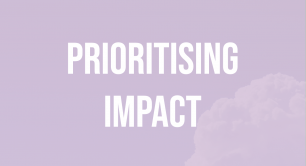Why Covid-19 has made us impatient for more patient, flexible capital
Covid-19 has highlighted the fact that many common forms of social investment are inflexible and have failed the social enterprises they seek to support, says Ben Smith, head of social investment at Esmée Fairbairn Foundation. But being patient and flexible is not without its challenges.
In October, we – Esmée Fairbairn Foundation – launched our new strategy which focuses on three interdependent aims: improving Our Natural World; tackling injustice to deliver A Fairer Future; nurturing Creative, Confident Communities.
By focussing on these three aims, we believe we can have a deeper and more lasting impact on some of the biggest challenges of today. And we will use all our tools – including social investment – to achieve them. We believe this will heighten the potential for genuine and thoughtful blended finance to enable positive change, rather than seeing social investment as an end in itself or in a silo as is common.
Our new approach to social investment
In considering the specific role that social investment can play, we have developed a new approach to social investing with three strategic objectives:
- Making impact-first direct investments
- Influencing the social investment market
- Learning and sharing.
What is common across those objectives is a desire to address market failure through innovative, creative co-design, driven by a desire to be catalytic and most importantly, impact-first.
We also remain committed to new ideas. Both those which are aligned to our aims and those that support the evolution, and where necessary, disruption of the social investment market.
Previous examples of this include: quasi-equity investments into Ethex, creating potentially transformative infrastructure; a repayable grant facility into Resonance which resulted in over £700,000 of drawdowns and the launch of the National Homeless Property Fund, Real Lettings Property Fund and South West Social Investment Tax Relief Fund; and the Big Issue Invest-led initiative designed to measure the efficacy of non-financial support provided by funds.
Why patient and equity-like investments are more important than ever
Invariably, when we talk about being creative and co-designing social investments, we land on the importance of being patient and flexible.
Already over 40% of our active portfolio is in flexible, non-standard social investments and 46% of our social investment is in financial instruments with a maturity of 10 years or greater.
So, our focus on co-designed and innovative finance is not new; it is a case of evolution since we formalised our social investing in 2008, not revolution.
Our longstanding belief in a patient, equitable and co-designed approach to social investment has gathered momentum over recent months. Covid-19 has highlighted that many previously common forms of social investment have failed the social enterprises they seek to support through inflexibility. Not only do we believe rigid approaches stifle innovation, they also go against the purpose of social investment: to place the social enterprise at the heart of investments. We must focus on the organisation’s need, not the needs of the investor.
Many previously common forms of social investment have failed the social enterprises they seek to support through inflexibility
We also know that there is significant unmet need for this type of finance. Our grant to Shift Design supported a review of equity-like demand which has helped bring more evidence to what we already knew.
Examples of this in action include our £500,000 research and development grant funding as part of a partnership with the Environment Agency and Defra into four projects delivering environmental improvements. The hope is that staged innovation funding spanning feasibility, research and development and execution, may result in proven models which can attract social investment, and, in future, larger sums of ‘mainstream’ cash to tackle significant environmental problems.
Other examples include:
- £1.8m facility designed with Rivers Trust – an umbrella body seeking to protect, promote and enhance river environments – to plug the gap created by the Government’s Water Environment Grant which pays in arrears;
- £255,000 blended repayable revolving facility and grant commitment to RefuAid – an organisation supporting refugees with language tuition, access to Higher Education and an interest-free loan scheme to enable requalification. The investment was made alongside Barrow Cadbury Trust and built on the learning from Joseph Rowntree Foundation and Comic Relief’s previous investments into the organisation;
- £500,000 perpetual bond investment into Fair for You – the affordable credit provider.
The challenges
Our approach is not without its challenges: 26% of our (85) exited investments have failed to break-even. Furthermore, lengthy investment terms mean that some investments will invariably fall out of alignment with impact priorities over time. Lack of liquidity for the investor is also a bi-product of long-term investing, as is the amount of resource and expertise needed for deal structuring and portfolio management. These difficulties are to be expected when you take a long-term, high-risk approach.
Yet these challenges can be overcome through a combination of: mission-aligned, patient wholesale finance; a well-skilled adequately resourced staff base; and quality, regular data to facilitate early indications of stress in a portfolio and identify areas of positive learning to extract and share.
26% of our exited investments have failed to break-even. Furthermore, some investments will invariably fall out of alignment with impact priorities over time
The opportunities
Our 1.6% return across our exited investments shows that positive returns are possible.
However, focusing on financial returns alone would be a significant failure of what social investment seeks to achieve. What’s more important is the impactful initiatives flexible finance can create, such as our recent investment into Think for the Future – an organisation improving behaviour and preventing exclusions for young people – to purchase an education hub in the Midlands. This at a below-market rate with the deal structured to attract future refinancing. We worked with Think for the Future to invest when mainstream banks, and others, turned them down.
While Covid-19 has highlighted the failure of some areas of social investment, it has also led to the growth of others and an increase in collaboration. Connect Fund’s call for ideas to support the deployment of Access Foundations’ Flexible Finance for the Recovery is an example of something positive which can come out of hardship.
We will continue to champion co-designed, flexible and appropriate social investment, which can enable positive societal change. We encourage others to adopt this approach and welcome further collaboration to make social investment a more effective tool that places the social enterprise at the heart of investments.
Thanks for reading our stories. As an entrepreneur or investor yourself, you'll know that producing quality work doesn't come free. We rely on our subscribers to sustain our journalism – so if you think it's worth having an independent, specialist media platform that covers social enterprise stories, please consider subscribing. You'll also be buying social: Pioneers Post is a social enterprise itself, reinvesting all our profits into helping you do good business, better.




